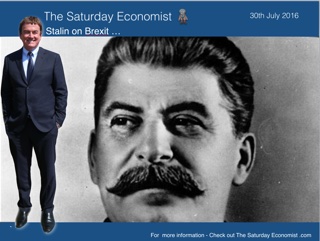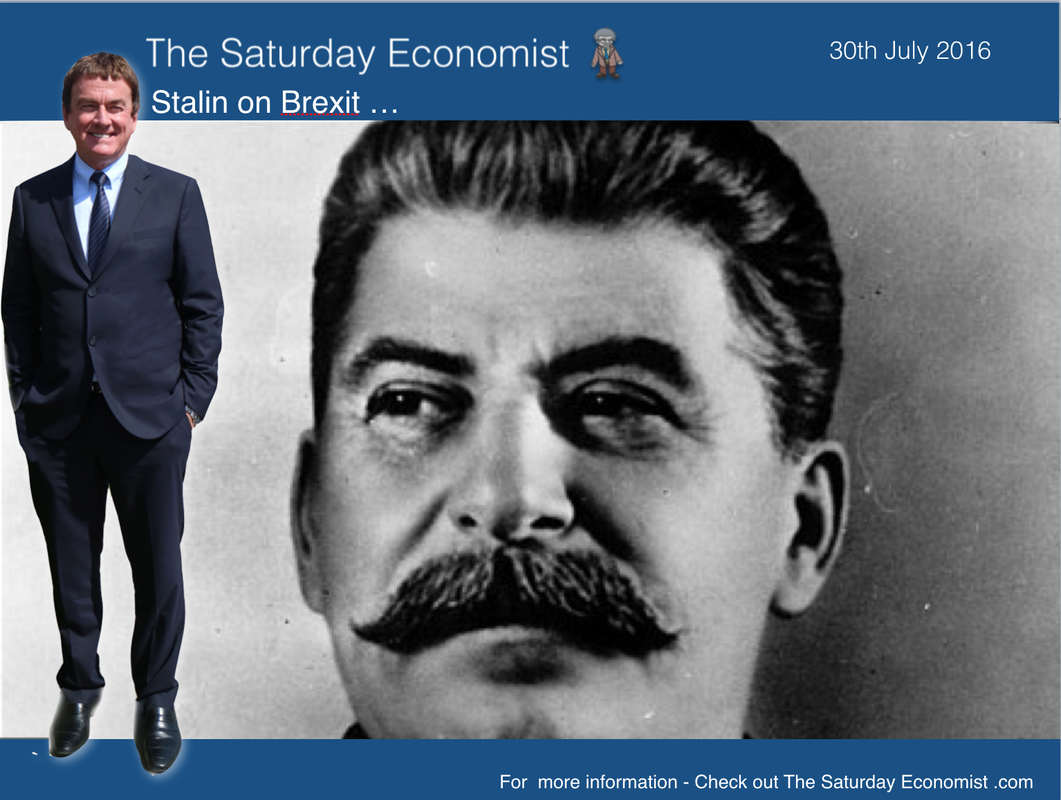 “Capitalists will sell us the rope by which they will hang” said Stalin. No need for communists to undertake the task, businesses are in danger of commercial suicide if gloom persists about the impact of the referendum result. “Waiting for Godot” or capitalising on the hanging tree with a stronger belt the options in Beckett’s drama. So too, the options loom for UK business. In the UK, survey data continues to cast a gloom over the economy. Little reason why this should be the case. Post referendum nothing has really happened yet. Nor is it likely to for the next five years. Stalin said, “It is not the people who cast the vote who determine the election, it is the people who count the votes that really matter”. Better still and not too late for the referendum, the counters also get to interpret the result. So why so gloomy? UK GDP growth of 2.2% in the second quarter of the year … Growth in the UK increased by 2.2% in the second quarter up from 1.8% in the first quarter of the year. A strong performance in services was boosted by 5% growth in the leisure sector and 2.7% growth in business services. Construction output fell by 1.2%. Weakness of government spending is largely to blame, offsetting the strength in private sector housing and commercial real estate. A surprise leap in manufacturing output produced growth of 1.4% in the quarter. We as yet cannot determine if this is just a blip, or a return to trend growth. Our forecast manufacturing growth of just 0.1% this year would increase to 1.1% if this were the case, with little or no material impact on overall GDP. We have reduced our forecast for GDP growth for the current year to 1.9% slowing to 1.3% in 2017. The forecast could be upgraded if the Autumn review were to release new funds for infrastructure and housing. Bank of England Set to Act … According to Sam Coates writing in The Times today, the Bank of England is set to forecast zero growth next year from 2% previously. Speculation persists a further round of QE or even a rate cut is possible in August, as the Old Lady Frets about the referendum result. Let’s hope not. The damage to savers and the banking sector is already intense. There is little in the handbooks to suggest a further cut would have any positive impact on activity or sentiment. Survey data continues to cast a gloom over the economy. Little reason why this should be the case. Post referendum nothing has really happened yet. Nor is it likely to for the next five years. Article 50 will not be triggered until 2017. No trade talks will take place until the exit timetable and framework has been agreed. It would appear that every board room has a Brexit bin at present. Profit warning … dump it in the Brexit bin. Need to restrutcure … dump it in the Brexit bin. Job losses … dump it in the Brexit bin. Problems with sterling weakness? Then businesses should have been hedging synthetically or naturally. In any case, there is no reason to assume Sterling weakness is a structural adjustment without fundamentals to sustain the move. Technically oversold, a bounce back is possible if the Bank of England holds rates and begins to hint at an increase. Inflation is set to rise in the final quarter of the year as oil prices increase by over 30% in sterling terms. In the first quarter of 2017, prices will rise by over 60% assuming oil and sterling hold at closing prices as of this week. No time to cut rates. The implications could be devastating! I would be forced to admit that Danny Blanchflower was right all along! So what happened in the USA … US GDP increased by just 1.2% in the second quarter of the year. This was below estimates and the 1.6% growth recorded in the first quarter. Strong growth in consumer spending was offset by the weakness in investment particularly in the oil sector. Expectations of a Fed rate rise in September have receded slightly. A strong jobs market, rising house prices and healthy household spending may yet force a rate rise in early Autumn. So what happened to markets ? Sterling rallied against the Dollar to $1.323 from $1.309 but moved down against the Euro at €1.185 from €1.194. The Euro moved up against the Dollar to 1.116 from 1.096. Oil Price Brent Crude closed at $42.36 from $45.27. The average price in July last year was $56.56. In August it was $46.52. Markets, were down - The Dow closed up at 18,441 from 18,583. The FTSE closed at 6,724 from 6,730. Gilts - yields moved down. UK Ten year gilt yields closed at 0.69 from 0.82. US Treasury yields moved to 1.48 from 1.58. Gold closed at $1,350 from $1,320. John That's all for this week ... don't miss our what the papers review every morning @jkaonline. Don't miss our Masters of Strategy Series on Digital Disruption and the New Yahoo Case Study out now! If you enjoy the Saturday Economist, you will love our research on strategy. Join the mailing list here! Don't miss out! Finally Don't miss the Economics Conference in October, our theme is Manchester China ! Book Now! The material is based upon information which we consider to be reliable but we do not represent that it is accurate or complete and it should not be relied upon as such. We accept no liability for errors, or omissions of opinion or fact. In particular, no reliance should be placed on the comments on trends in financial markets. The receipt of this email should not be construed as the giving of advice relating to finance or investment..
0 Comments
Leave a Reply. |
The Saturday EconomistAuthorJohn Ashcroft publishes the Saturday Economist. Join the mailing list for updates on the UK and World Economy. Archives
July 2024
Categories
All
|
| The Saturday Economist |
The material is based upon information which we consider to be reliable but we do not represent that it is accurate or complete and it should not be relied upon as such. We accept no liability for errors, or omissions of opinion or fact. In particular, no reliance should be placed on the comments on trends in financial markets. The presentation should not be construed as the giving of investment advice.
|
The Saturday Economist, weekly updates on the UK economy.
Sign Up Now! Stay Up To Date! | Privacy Policy | Terms and Conditions | |

 RSS Feed
RSS Feed